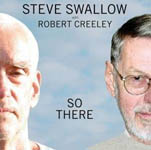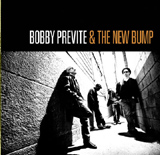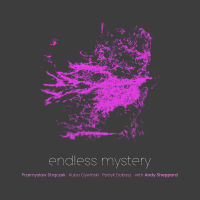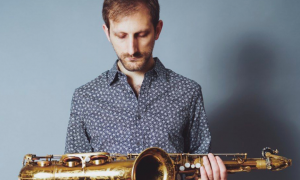Home » Jazz Articles » Interview » Steve Swallow: Embracing Music and Greater Awareness
Steve Swallow: Embracing Music and Greater Awareness
 For 50 years, Steve Swallow has represented the pinnacle of jazz bass playing. First on acoustic, then exclusively on electric bass, the versatile Swallow approaches every musical situation with grace and understated virtuosity. His discography reads like a Who's Who of the important improvisers of the 20th and early 21st Century. Swallow continues to tour extensively around the world and record with Carla Bley, Gary Burton, John Scofield and many others. AAJ contributor Matthew Miller spoke with Swallow at his winter home in Camino, in the British Virgin Islands.
For 50 years, Steve Swallow has represented the pinnacle of jazz bass playing. First on acoustic, then exclusively on electric bass, the versatile Swallow approaches every musical situation with grace and understated virtuosity. His discography reads like a Who's Who of the important improvisers of the 20th and early 21st Century. Swallow continues to tour extensively around the world and record with Carla Bley, Gary Burton, John Scofield and many others. AAJ contributor Matthew Miller spoke with Swallow at his winter home in Camino, in the British Virgin Islands. All About Jazz: Has the New York audience changed during your career?
Steve Swallow: Yeah, sure. When I began playing in the late '50s, there was a circuit of clubs in minority neighborhoods that sustained the music. You were playing for a community. That scene imploded in the late '60s and shifted to a primarily white, male audience and that hasn't really changed since then. That was a major shift.
AAJ: That shift corresponded with the emergence of jazz education. As someone who has taught in addition to gigging, touring and recording, can you give your impression of jazz education?
SS: I'm ambivalent about jazz education. One of my favorite lines on the subject comes from Paul Desmond, he said: "Jazz can be learned, but never taught." I've ended up being associated with jazz education because of my tenure at Berklee in the mid '70s, but aside from that, I've made it a point to restrict the amount of teaching I've done. After a few years at Berklee, I stopped because I had come to a crossroads. I had to choose between teaching and performing.
AAJ: Did you face a similar decision as a literature student at Yale in the late '50s when you left school to move to New York?
 SS: Yes. In 1960, I left school because I had to play. I wanted to jump into the [New York] community of players, to search out my peers, to test myself against them. I had some reservations about leaving Yale, but I felt that I was faced with an either-or decision. I had to make an emphatic decision to embrace music.
SS: Yes. In 1960, I left school because I had to play. I wanted to jump into the [New York] community of players, to search out my peers, to test myself against them. I had some reservations about leaving Yale, but I felt that I was faced with an either-or decision. I had to make an emphatic decision to embrace music.
When I came to New York, there was a community of older players and gifted peers. The university world wasn't the right environment to become a bassist. At this point, it might be a better choice for a young bassist to go to Berklee instead of NYC, but that wasn't the case then. That's not to say that New York hasn't remained the place to go. I think there's a wonderfully vibrant scene in NYC right now.
AAJ: You were a literature student as an undergrad and your recent release, So There, featured the poet Robert Creeley. How have literary influences or any non-musical interests, affected you musically?
SS: They've had a tremendously strong influence on me. Literature particularly, but also the visual arts and life around me. I've learned as much from Bob Creeley as any musical source. There's a great deal to be had from non-musical sources and my music has been greatly enhanced by them. I think there's a great danger in narrowing your sources too much. I've known remarkable bass players who have spent endless hours practicing, but they've paid a price: a lack of awareness of the world outside the bass. In the end, that limits their effectiveness as musicians.
AAJ: How has living with Carla Bley influenced you as a player and composer? How have you influenced her?
SS: We've had a profound influence on each other. It was inevitable. Our collaboration is a kind of complicated back and forth. I think I'm basically a player who writes and she is a writer who plays. I've told her more from a player's perspective and she's helped me from a composer's perspective and so we've been of most assistance to each other in that way.
We write on a daily schedule, seven days a week, in periods defined by beverage: coffee, tea, etc. It's a job. We never write together, but we do talk about it. Occasionally, one will say something that sets the other off in a promising direction. Eventually, we'll play it together and then it's back to the drawing board. You have to establish in your mind your value as a composer. Nobody calls on the phone to ask me for a piece of music, whereas when you're a player, the phone rings and you're asked to play. In terms of composing, it all comes down to self-motivation and discipline; Carla definitely has these qualities. She's shown me the discipline I lack and I've shown her things as a player.
AAJ: Her writing is so pure and personal. It seems that she's writing for herself, for the sake of the music, instead of writing for a particular player. Kind of like the antithesis of the Ellington model.
 SS: She's usually writing for particular players, but the cast is changing. She's been writing music specifically for the The Lost Chords and most recently for trumpeter Paolo Fresu. In terms of Duke's music and Monk for that matter, I think it's there to be reinterpreted by subsequent generations. I think Monk's music is being played better now than in his lifetime. Young players are giving knowing and assured performances. Carla's music has a similar degree of difficulty and complexity. I strongly believe that the performances she's hoping for will happen after she's dead. Carla is constructing formidable challenges and standing apart from the community, for better or worse. She gives players what they need instead of what they want. She's done that with me.
SS: She's usually writing for particular players, but the cast is changing. She's been writing music specifically for the The Lost Chords and most recently for trumpeter Paolo Fresu. In terms of Duke's music and Monk for that matter, I think it's there to be reinterpreted by subsequent generations. I think Monk's music is being played better now than in his lifetime. Young players are giving knowing and assured performances. Carla's music has a similar degree of difficulty and complexity. I strongly believe that the performances she's hoping for will happen after she's dead. Carla is constructing formidable challenges and standing apart from the community, for better or worse. She gives players what they need instead of what they want. She's done that with me.
AAJ: In terms of your playing, I've always been impressed with your sensitivity as an accompanist and the virtuosic understatement that underlies all your work. In your eyes, how has your playing evolved over the years?
SS: Um, I like to think it has evolved. I very seldom listen to my past recordings. I'm reluctant to listen to them. I'm afraid I'll find myself better in 1965 (laughs). I recently listened to a recording with Monk I did in the mid-'60s [at the Monterey Jazz Festival]. Anyway, I was pleasantly surprised; I felt I sounded good. I knew it was indeed me and I found that interesting. It leads me to believe that what you play is like your fingerprint. It's you.
 A player should be reconciled to the fact that the elements of his playing are unchanged, like his voice. Of course, there are parts that can be rearranged and that's what I've tried to work with. Technique is the broad word for it, but I need to define it further. For me, it's the sound I'm getting. It's interpretation, how to phrase, how to make the music sing and breathe. It's been an ongoing process at a steady measured pace. Every now and then one has an "ah ha!" moment, but it certainly seems to be mostly a slow, consistent move forward for me. I wish I had had a greater sense of urgency when I was 20. It took me a lot of time to get focused and even more time to hit my stride; I was a late bloomer.
A player should be reconciled to the fact that the elements of his playing are unchanged, like his voice. Of course, there are parts that can be rearranged and that's what I've tried to work with. Technique is the broad word for it, but I need to define it further. For me, it's the sound I'm getting. It's interpretation, how to phrase, how to make the music sing and breathe. It's been an ongoing process at a steady measured pace. Every now and then one has an "ah ha!" moment, but it certainly seems to be mostly a slow, consistent move forward for me. I wish I had had a greater sense of urgency when I was 20. It took me a lot of time to get focused and even more time to hit my stride; I was a late bloomer.
AAJ: You started out on piano and trumpet. What made you take up the bass?
SS: I just picked it up in 8th grade. It hit me like a ton of bricks; it was an instantaneous conversion and I left the piano and trumpet behind. The same thing happened when I was 29 and I touched the electric bass for the first time. I knew the electric bass and I were off into the sunset together.
AAJ: Ever pick up the upright for old-times sake?
SS: No. But every once in a while, if I see a beautiful one lying backstage at a festival, like Charlie Haden's bass, I'll pick it up and hit the E string, just to feel it vibrate against my body. It's one of the great feelings in life.
Selected Discography
Carla Bley, The Lost Chords Find Paolo Fresu (Watt, 2007)
Steve Swallow, Damaged in Transit (XtraWatt, 2001)
Paul Bley/Jimmy Giuffre/Steve Swallow, The Life of a Trio: Saturday/Sunday (Owl/Sunnyside, 1989)
Steve Kuhn, Trance (ECM, 1974)
Paul Bley, Closer (ESP-Disk, 1965)
Jimmy Giuffre, 1961: Fusion/Thesis (ECM, 1961)
Photo Credit
Juan-Carlos Hernandez
Tags
PREVIOUS / NEXT
Support All About Jazz
 All About Jazz has been a pillar of jazz since 1995, championing it as an art form and, more importantly, supporting the musicians who make it. Our enduring commitment has made "AAJ" one of the most culturally important websites of its kind, read by hundreds of thousands of fans, musicians and industry figures every month.
All About Jazz has been a pillar of jazz since 1995, championing it as an art form and, more importantly, supporting the musicians who make it. Our enduring commitment has made "AAJ" one of the most culturally important websites of its kind, read by hundreds of thousands of fans, musicians and industry figures every month.





















